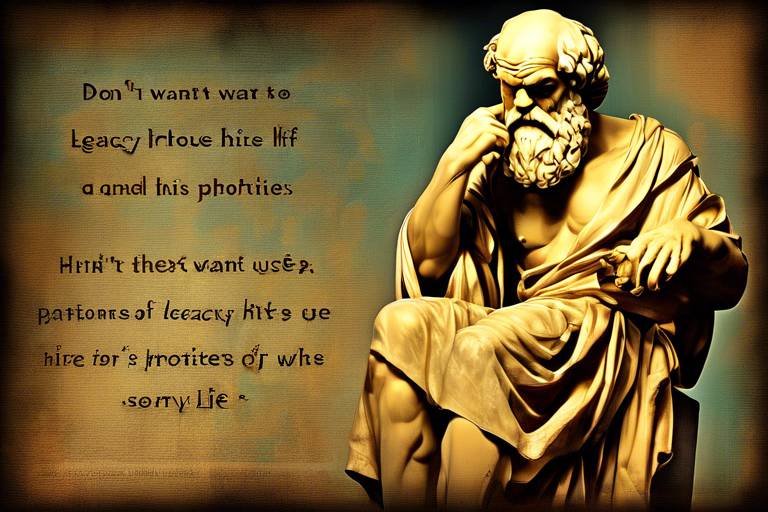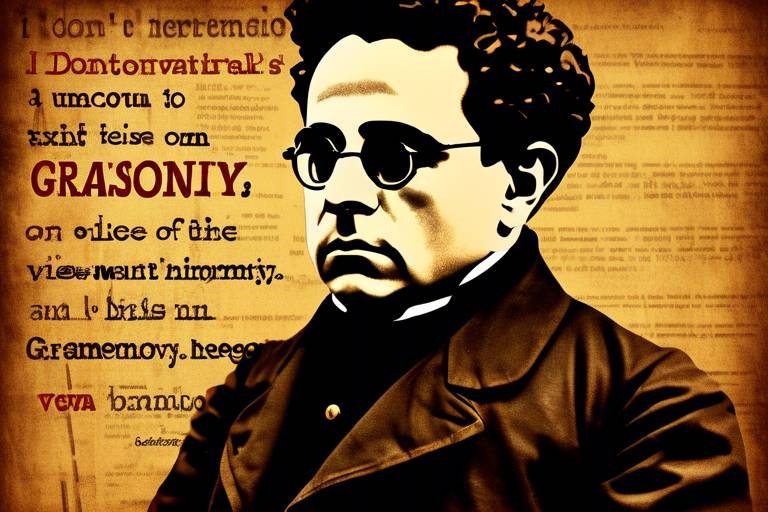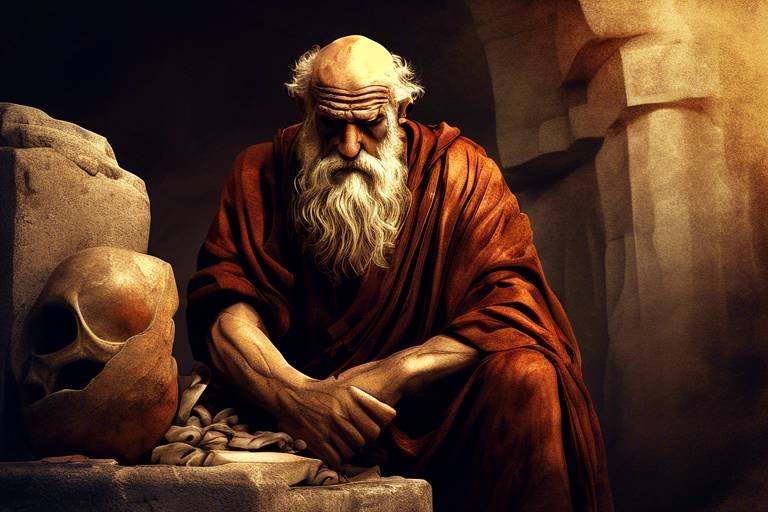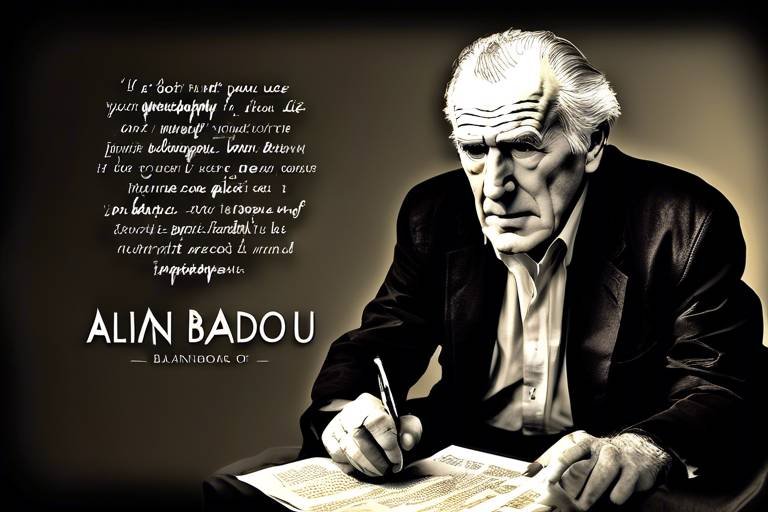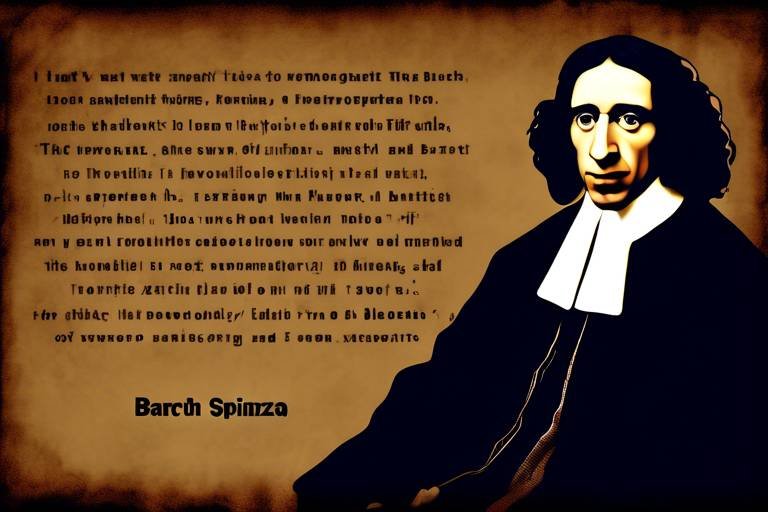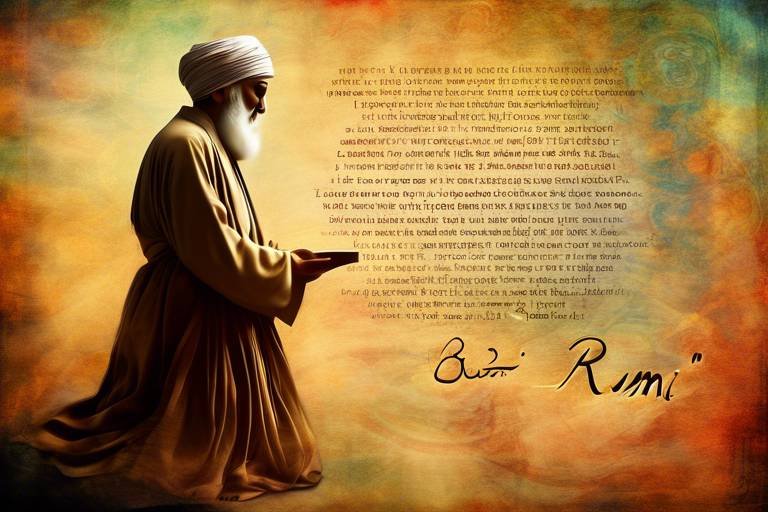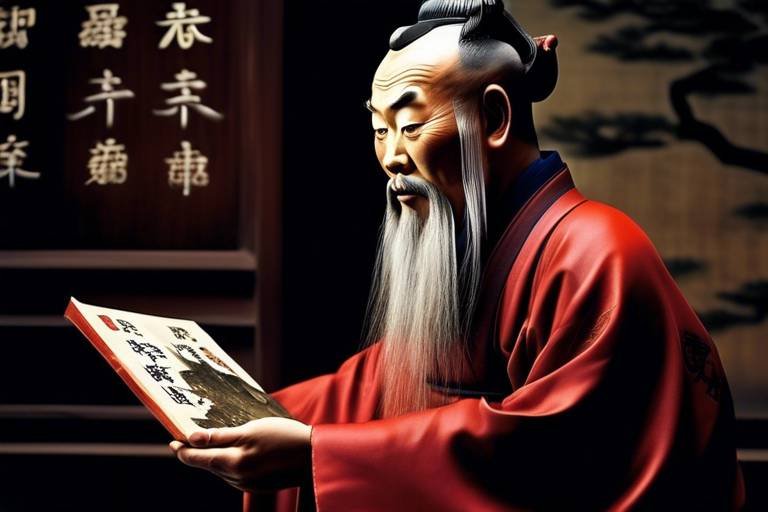The Legacy of Socrates - His Life and Philosophies
Socrates, often hailed as the father of Western philosophy, left an indelible mark on the intellectual landscape that continues to shape our understanding of ethics, knowledge, and the very essence of human existence. Born in Athens around 470 BC, Socrates lived during a time of great political and social upheaval, a period that undoubtedly influenced his thoughts and teachings. His life was not one of wealth or luxury; rather, he was a humble man who roamed the streets of Athens, engaging in conversations with anyone willing to discuss the big questions of life. But what made Socrates truly unique was his approach to philosophy—not as a mere academic exercise, but as a way of life.
His method of inquiry, known as the Socratic Method, involved asking probing questions that challenged assumptions and encouraged deep reflection. This method was not just about seeking answers; it was about fostering critical thinking and illuminating ideas through dialogue. Imagine sitting down for a cup of coffee with a friend who keeps asking, "But why do you believe that?" or "What do you really mean by that?" This is the essence of Socratic dialogue—a relentless pursuit of clarity and truth.
Despite his profound influence, Socrates did not leave behind any written works. Instead, we rely on the accounts of his students, particularly Plato, who immortalized his teachings and character in dialogues. Socrates believed that knowledge was virtuous and that understanding the good life was paramount. His famous assertion that "the unexamined life is not worth living" serves as a powerful reminder of the importance of self-reflection and the quest for wisdom.
As we delve deeper into Socrates' life and philosophies, we will explore the significance of his ideas, the method he employed, and the enduring legacy that continues to resonate in modern thought. From his ethical views to the dramatic events surrounding his trial and execution, Socrates' life serves as a testament to the power of ideas and the courage to stand by one’s beliefs, even in the face of death.
To truly appreciate Socrates' contributions, it's essential to understand the historical context in which he lived. The city of Athens was a hub of intellectual activity during the 5th century BC, marked by the flourishing of democracy, art, and philosophy. Socrates was influenced by earlier thinkers such as Heraclitus and Pythagoras, but he took a different approach by focusing on ethical questions and the nature of knowledge.
His early years, spent in the company of artisans and the common people, shaped his belief that wisdom was not the exclusive domain of the elite. Instead, he sought to engage everyone in philosophical inquiry, believing that every individual had the potential to contribute to the pursuit of truth. This democratization of philosophy was revolutionary at the time and laid the groundwork for future philosophical discourse.
At the heart of Socratic philosophy lies the Socratic Method, a form of cooperative argumentative dialogue that encourages critical thinking. This method is characterized by asking and answering questions to stimulate deeper thought and illuminate ideas. It’s like peeling an onion—each layer reveals something new and often unexpected.
Dialogue, for Socrates, was not merely a means of communication; it was a vital tool for exploring complex concepts. He believed that through conversation, individuals could uncover deeper truths about themselves and the world around them. In a society where dogma often reigned, Socrates championed the idea that questioning and discussion were essential for understanding.
Consider how the Socratic Method can be applied in various contexts, from education to personal development. In classrooms, teachers can use this method to encourage students to think critically and engage with the material actively. For instance, instead of simply lecturing, a teacher might pose a challenging question about a text, prompting students to explore their thoughts and beliefs. This interactive approach not only deepens understanding but also fosters a love for learning.
However, the Socratic Method is not without its critics. Some argue that it can lead to confusion or frustration, especially if participants are not well-versed in the subject matter. Others point out that it may not always lead to clear answers, leaving individuals in a state of uncertainty. Nevertheless, the method's ability to provoke thought and discussion remains invaluable in today's discourse.
Socrates' views on ethics were deeply intertwined with his belief in the importance of virtue. He argued that knowledge and virtue were inextricably linked; to know the good was to do the good. This perspective challenges us to consider our own moral compass and the motivations behind our actions. Are we acting out of ignorance, or do we truly understand the implications of our choices?
The events leading to Socrates' trial are as dramatic as they are philosophically significant. Accused of corrupting the youth of Athens and impiety, Socrates stood before a jury of his peers, defending his life's work and principles. His eventual death sentence was not just a personal tragedy but a profound statement about the societal values of his time.
Socrates' execution sparked discussions about martyrdom and the pursuit of truth that continue to resonate today. His unwavering commitment to his beliefs, even in the face of death, serves as a powerful reminder of the importance of standing up for one’s principles. His legacy encourages us to question not only the world around us but also our own beliefs and motivations.
Following Socrates, philosophers like Plato and Aristotle built upon his ideas, shaping the trajectory of Western thought. Plato's dialogues often featured Socrates as the protagonist, exploring themes of justice, virtue, and the nature of knowledge. Aristotle, while critical of some of Socratic ideas, acknowledged the foundational role Socrates played in the development of philosophical inquiry.
Today, Socratic principles continue to resonate in contemporary philosophical debates and educational practices. The emphasis on critical thinking, dialogue, and ethical inquiry remains relevant, encouraging us to engage deeply with the world around us. Socrates may have lived over two millennia ago, but his ideas challenge us to examine our lives and strive for a deeper understanding of truth.
- What was the Socratic Method? The Socratic Method is a form of dialogue that uses questioning to stimulate critical thinking and illuminate ideas.
- Why is Socrates considered the father of Western philosophy? Socrates is considered the father of Western philosophy due to his foundational contributions to ethics, epistemology, and the practice of philosophical inquiry.
- What were the main charges against Socrates? Socrates was charged with corrupting the youth of Athens and impiety, leading to his trial and eventual execution.
- How did Socrates influence later philosophers? Socrates' ideas laid the groundwork for future philosophers like Plato and Aristotle, shaping the development of Western thought.
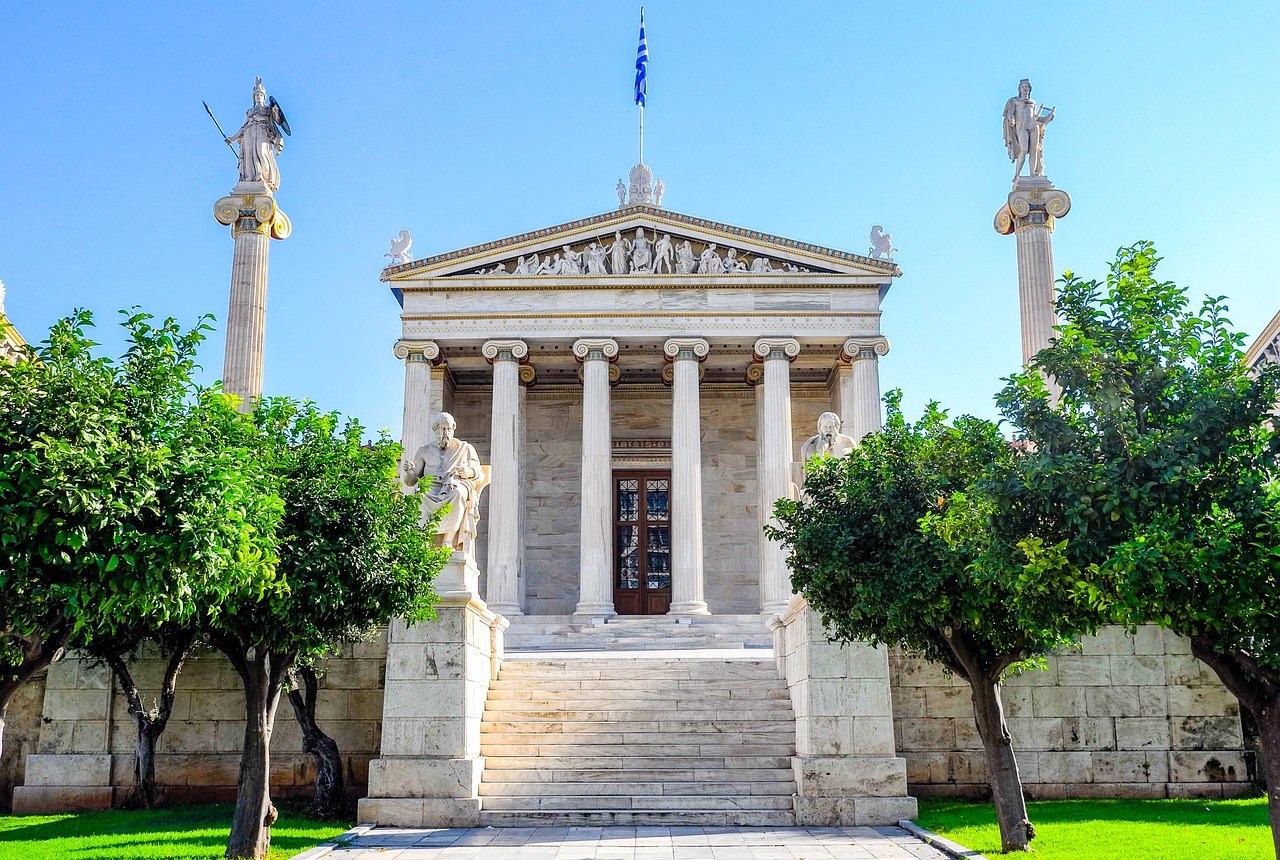
Socrates: A Historical Overview
Socrates, often hailed as the father of Western philosophy, lived during a time of great political and social upheaval in ancient Athens. Born around 470 BCE, he emerged in an era marked by the decline of the Athenian Empire and the rise of democratic ideals. His life was steeped in the rich cultural tapestry of the time, influenced by the works of earlier philosophers and the vibrant intellectual climate that surrounded him. Socrates was not just a thinker; he was a man of the people, engaging in dialogues with citizens in the marketplace, questioning their beliefs and assumptions.
His early life remains somewhat shrouded in mystery, but it is believed that he was born to a stonemason and a midwife. This humble beginning did not deter him from pursuing knowledge. Instead, it fueled his desire to understand the world around him. Socrates was deeply influenced by the pre-Socratic philosophers, such as Heraclitus and Pythagoras, who laid the groundwork for metaphysical inquiry. However, unlike his predecessors, Socrates did not leave behind written works; his teachings and philosophies were transmitted through the dialogues of his students, most notably Plato.
The historical context of Socrates' life is essential for grasping the significance of his contributions. Athens, during the 5th century BCE, was a hub of political experimentation and philosophical inquiry. The city was characterized by its democratic governance, which allowed for the free exchange of ideas. However, this very democracy also rendered Socrates vulnerable; his relentless questioning of societal norms and moral values eventually led to his trial and execution. The charges against him—corrupting the youth and impiety—reflect the tension between his philosophical pursuits and the prevailing beliefs of Athenian society.
To better understand Socrates’ life, consider the following table that summarizes key aspects of his historical context:
| Aspect | Details |
|---|---|
| Birth Year | c. 470 BCE |
| Death Year | 399 BCE |
| Major Influences | Heraclitus, Pythagoras, Sophists |
| Key Contributions | Socratic Method, Ethical Philosophy |
| Historical Context | Athenian Democracy, Peloponnesian War |
Socrates' approach was revolutionary; he believed that understanding oneself was the key to understanding the world. His famous dictum, "Know thyself," encapsulates his philosophy. He challenged his contemporaries to reflect on their lives and beliefs, fostering a culture of critical thinking that remains relevant today. Through his dialectical method, he encouraged people to question their assumptions and seek deeper truths. This method of inquiry not only laid the foundation for Western philosophy but also established a framework for educational practices that prioritize dialogue and critical engagement.
In summary, Socrates was more than just a philosopher; he was a catalyst for change in a society ripe for intellectual exploration. His life and teachings continue to resonate, reminding us that the pursuit of knowledge and truth is a timeless endeavor. As we delve deeper into his philosophies and methods, we uncover the profound legacy that Socrates has left behind, one that challenges us to think critically and engage with the world around us.
- What was the Socratic Method? The Socratic Method is a form of cooperative argumentative dialogue that stimulates critical thinking through questioning.
- Why was Socrates put on trial? Socrates was charged with corrupting the youth of Athens and impiety, leading to his eventual execution.
- What is the significance of "Know thyself"? This phrase emphasizes the importance of self-awareness and understanding one's own beliefs and values.
- How did Socrates influence later philosophers? His ideas laid the groundwork for the philosophies of Plato, Aristotle, and many others, shaping Western thought.

The Socratic Method
The Socratic Method is not just a technique; it's a profound approach to learning and understanding that has stood the test of time. Developed by the ancient Greek philosopher Socrates, this method involves a form of cooperative argumentative dialogue that challenges assumptions and stimulates critical thinking. Imagine sitting in a circle, engaging in a conversation where every question leads to deeper insights. That's the essence of the Socratic Method. It encourages participants to explore their beliefs and the reasons behind them, promoting a culture of inquiry rather than mere acceptance of information.
At its core, the Socratic Method is about asking questions—questions that provoke thought and reflection. This can be likened to peeling an onion; each layer represents a different facet of understanding, and as you peel back each layer, you uncover deeper truths. Through this dialogue, participants are encouraged to articulate their thoughts clearly, which not only enhances their comprehension but also fosters a sense of ownership over their ideas. By engaging in this process, individuals often arrive at conclusions they may not have considered before, leading to a richer understanding of the topic at hand.
The beauty of the Socratic Method lies in its versatility. It can be applied in various contexts, from classrooms to boardrooms, and even in personal development settings. For instance, educators often use this method to promote critical thinking among students. Instead of simply lecturing, teachers might pose challenging questions, guiding students to explore concepts collaboratively. This not only makes learning more engaging but also cultivates an environment where students feel safe to express their thoughts and challenge each other respectfully.
Dialogue is the heartbeat of the Socratic Method. It is through dialogue that we can navigate complex concepts and diverse viewpoints. Socrates believed that the act of questioning is vital for uncovering truth. In a world where misinformation can spread like wildfire, the ability to engage in meaningful conversations is more crucial than ever. Consider how often we encounter differing opinions online; the Socratic Method offers a pathway to constructive discourse. By focusing on questions rather than statements, we can foster understanding and bridge divides.
To illustrate the practical application of the Socratic Method, let’s look at a few real-life scenarios:
| Context | Example | Outcome |
|---|---|---|
| Education | In a philosophy class, students debate the definition of justice. | Students develop critical thinking skills and arrive at a nuanced understanding of justice. |
| Corporate Training | In a team meeting, leaders ask questions about project strategies. | Team members feel valued, leading to innovative ideas and solutions. |
| Personal Growth | A mentor uses the method to help a mentee clarify career goals. | The mentee gains clarity and confidence in their decision-making. |
While the Socratic Method is celebrated for its strengths, it is not without its critiques. Some argue that it can lead to confusion rather than clarity, especially if participants are not well-versed in the subject matter. Additionally, the method's reliance on dialogue may not suit everyone; some individuals may prefer direct instruction or written communication. Furthermore, in a fast-paced world, lengthy discussions can sometimes feel impractical. However, these critiques do not diminish the method's value; rather, they highlight the importance of adapting the approach to fit different contexts and audiences.

Importance of Dialogue
Dialogue is not merely a way of exchanging words; it is a profound tool for uncovering the layers of meaning that lie beneath our surface-level understanding. Socrates, with his unique approach to conversation, demonstrated that through dialogue, we can challenge our assumptions and broaden our perspectives. Imagine standing on the edge of a vast ocean, where every wave represents a new idea or insight. Engaging in dialogue allows us to dive into that ocean, exploring depths we might never have considered. It’s about creating a space where thoughts can collide and evolve, leading to a richer understanding of complex concepts.
Socrates believed that through questioning and discussion, we could illuminate ideas that might otherwise remain shrouded in darkness. This method of inquiry is not just about finding answers; it’s about fostering critical thinking and encouraging individuals to examine their beliefs closely. When we engage in dialogue, we invite others to share their perspectives, creating a tapestry of thoughts that enhances our own understanding. It’s like a dance, where each participant contributes to the rhythm and flow, ultimately creating a more harmonious outcome.
Furthermore, the importance of dialogue extends beyond the mere exchange of ideas. It cultivates a sense of community and connection. In our increasingly polarized world, where it’s easy to retreat into echo chambers, Socratic dialogue serves as a reminder of the value of engaging with differing viewpoints. It encourages empathy and understanding, allowing us to appreciate the nuances of others’ experiences. By embracing dialogue, we can dismantle barriers and foster relationships built on mutual respect and curiosity.
To illustrate the significance of dialogue, consider the following points:
- Critical Thinking: Engaging in dialogue challenges us to think critically and question our own beliefs.
- Collaboration: It encourages collaborative problem-solving, where diverse perspectives lead to innovative solutions.
- Empathy: Dialogue fosters empathy, helping us understand and appreciate the experiences of others.
- Personal Growth: Through dialogue, individuals can experience personal growth by reflecting on their thoughts and ideas.
In essence, the importance of dialogue in Socratic philosophy cannot be overstated. It is the lifeblood of intellectual exploration, a means of connecting with others, and a pathway to deeper understanding. By embracing this method, we not only honor Socrates' legacy but also cultivate a more thoughtful and compassionate world.
What is the Socratic Method?
The Socratic Method is a form of cooperative argumentative dialogue that encourages critical thinking through questioning. It aims to stimulate discussion and illuminate ideas.
How does dialogue enhance learning?
Dialogue enhances learning by allowing individuals to explore different viewpoints, challenge their assumptions, and develop a deeper understanding of complex subjects.
Can dialogue be applied in everyday life?
Absolutely! Dialogue can be applied in various contexts, from educational settings to personal relationships, fostering communication and understanding in everyday interactions.
Why is empathy important in dialogue?
Empathy is crucial in dialogue as it allows participants to connect on a deeper level, fostering respect and understanding, which are essential for productive conversations.

Case Studies in Dialogue
When we think about the Socratic Method, it’s easy to imagine a dusty old classroom filled with students listening to a wise philosopher. But the beauty of Socratic dialogue extends far beyond the confines of ancient Greece. Today, we see its influence in various fields, from education to therapy, and even in corporate training sessions. Let’s dive into a few compelling case studies that illustrate the power and versatility of dialogue.
One of the most striking examples comes from the realm of education. A high school teacher, Mrs. Thompson, decided to implement the Socratic Method in her literature class. Instead of merely lecturing about Shakespeare’s Hamlet, she posed open-ended questions to her students, such as, “What do you think drives Hamlet’s indecision?” This approach transformed her classroom into a vibrant forum of ideas where students felt encouraged to express their thoughts and challenge each other’s perspectives. The result? Increased engagement and deeper comprehension of the material. Students not only learned about the play but also developed critical thinking skills that would serve them well beyond the classroom.
In the field of psychotherapy, therapists often utilize Socratic questioning to help clients explore their beliefs and feelings. For instance, a therapist working with a client suffering from anxiety might ask, “What evidence do you have that supports your fear?” This method encourages clients to confront their irrational thoughts and examine the validity of their fears. By fostering a dialogue, clients can uncover underlying issues and develop healthier coping strategies. This approach is not just about finding answers but about empowering individuals to navigate their thought processes.
Corporate training programs have also adopted the Socratic Method to enhance team dynamics and problem-solving skills. In a recent workshop, a facilitator used Socratic dialogue to address a conflict between two departments. Instead of assigning blame, the facilitator guided the team through a series of questions that prompted them to reflect on their communication styles and assumptions. This dialogue not only resolved the immediate conflict but also fostered a culture of open communication and collaboration within the organization. It’s a prime example of how Socratic questioning can lead to transformative outcomes in professional settings.
These case studies highlight that the Socratic Method is not just a relic of philosophical history; it’s a dynamic tool applicable in various contexts. Whether in classrooms, therapy sessions, or corporate environments, the emphasis on dialogue fosters a culture of inquiry and reflection. This method encourages participants to think critically and engage meaningfully with the world around them, proving that the quest for knowledge is indeed a collaborative journey. As we continue to explore the depths of Socratic dialogue, it becomes clear that the legacy of Socrates lives on, inspiring new generations to seek truth through conversation.

Critiques of the Method
The Socratic Method, while celebrated for its ability to foster critical thinking and engage participants in deep discussions, is not without its critiques. Some scholars and educators argue that the method can lead to confusion rather than clarity. This is particularly true when participants are not adequately prepared or lack the foundational knowledge necessary to engage in meaningful dialogue. Critics often point out that the method's reliance on questioning can sometimes devolve into a form of interrogation, leaving individuals feeling exposed or defensive rather than enlightened.
Moreover, the Socratic Method assumes a certain level of intellectual equality among participants, which may not always be the case. In scenarios where there is a significant power imbalance—such as in a classroom setting with a teacher and students—the method can inadvertently reinforce existing hierarchies. For instance, a dominant voice may overshadow quieter participants, stifling diverse perspectives and limiting the richness of the dialogue. Critics argue that this can lead to a superficial exploration of ideas, rather than the profound understanding that Socrates intended.
Additionally, some argue that the method's emphasis on questioning can sometimes obscure the importance of providing direct answers or information. In contexts where clear guidance is needed—such as in educational settings focused on specific content knowledge—relying solely on inquiry may frustrate learners who seek concrete solutions. This raises a critical question: Is there a balance to be struck between inquiry and instruction? The challenge lies in integrating the Socratic Method with other pedagogical approaches to create a more holistic learning experience.
Another critique revolves around the method's effectiveness in addressing complex moral or ethical dilemmas. While Socrates believed that through questioning one could arrive at ethical truths, critics argue that moral philosophy is often more nuanced than the binary conclusions that the Socratic Method might suggest. The complexities of human experience and societal norms can rarely be distilled into simple questions and answers, making this method potentially reductive in its application.
In summary, while the Socratic Method has significantly influenced educational practices and philosophical discourse, it is essential to recognize its limitations. Understanding these critiques allows educators and philosophers alike to adapt the method, ensuring it remains a valuable tool for exploration rather than a rigid framework that may hinder genuine understanding.
- What is the Socratic Method? The Socratic Method is a form of cooperative argumentative dialogue that stimulates critical thinking through asking and answering questions.
- What are the benefits of using the Socratic Method? It encourages deeper understanding, promotes critical thinking, and enhances communication skills among participants.
- Can the Socratic Method be used in modern education? Yes, many educators incorporate the Socratic Method into their teaching to foster discussion and engagement in the classroom.
- What are some limitations of the Socratic Method? Limitations include potential confusion among participants, reinforcement of power dynamics, and its inadequacy in addressing complex moral dilemmas.
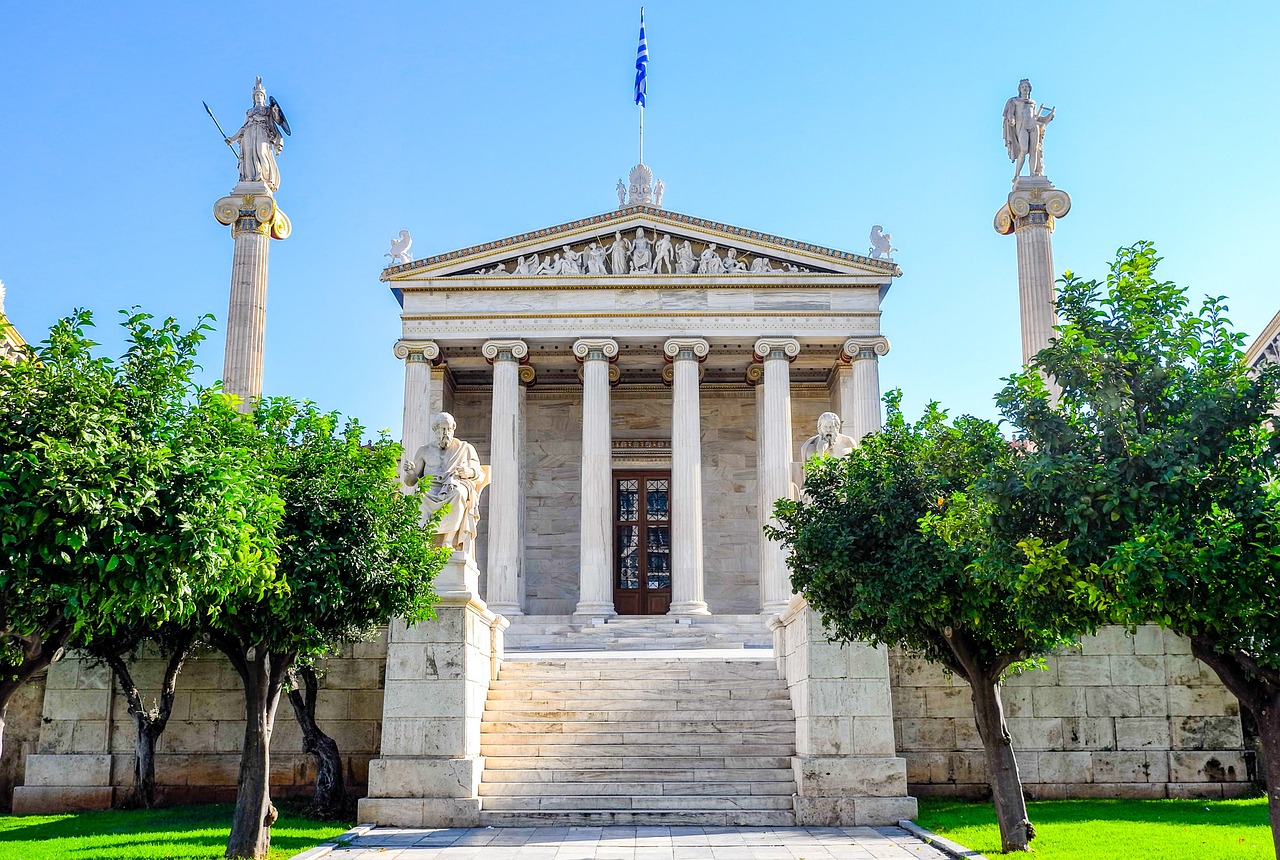
Ethics and Morality in Socratic Thought
Socrates, often hailed as one of the founding figures of Western philosophy, had profound insights into ethics and morality. Central to his philosophy was the belief that virtue is knowledge. In other words, he argued that if a person truly understands what is good, they will act accordingly. This idea challenges the notion that people can knowingly choose to do wrong; instead, it posits that wrongdoing stems from ignorance. To Socrates, wisdom and moral behavior are inextricably linked, suggesting that ethical behavior is not merely a matter of following rules but understanding the deeper truths behind those rules.
One of the most compelling aspects of Socratic ethics is his belief in the universality of moral truths. He maintained that there are objective standards of right and wrong that transcend societal norms and personal opinions. This perspective invites us to consider questions such as: What is justice? What does it mean to live a good life? Socrates believed that through rigorous questioning, individuals could arrive at these universal truths. His method of engaging others in dialogue was not just a way to teach; it was a means to explore and uncover these ethical principles collaboratively.
Moreover, Socrates emphasized the importance of self-examination and introspection in ethical conduct. He famously stated, "The unexamined life is not worth living." This declaration invites individuals to reflect on their actions and motivations, urging them to seek a deeper understanding of their values. By doing so, one can align their actions with their ethical beliefs, fostering a life of integrity and authenticity.
To illustrate his ethical framework, Socrates often engaged in discussions about specific virtues such as courage, temperance, and justice. He believed that these virtues were interconnected and essential for a well-lived life. In fact, he argued that true happiness could only be achieved through the cultivation of virtue. This perspective can be summarized as follows:
| Virtue | Definition | Importance |
|---|---|---|
| Courage | The ability to confront fear and uncertainty | Essential for facing challenges and making moral choices |
| Temperance | Self-control and moderation | Promotes balance and harmony in life |
| Justice | Fairness and equality in treatment of others | Foundation of social order and ethical behavior |
In conclusion, Socratic thought on ethics and morality provides a rich framework for understanding how we can navigate the complexities of human behavior. His insistence on the connection between knowledge and virtue challenges us to seek wisdom and engage in meaningful dialogues about our values. By embracing self-examination and striving for ethical understanding, we can aspire to live lives that are not only fulfilling but also aligned with universal principles of goodness.
- What is the Socratic Method? - A form of cooperative argumentative dialogue that encourages critical thinking through questioning.
- How did Socrates die? - Socrates was sentenced to death for allegedly corrupting the youth of Athens and impiety.
- What is the significance of Socratic ethics? - Socratic ethics emphasizes the importance of virtue and knowledge in moral behavior.
- Why is self-examination important in Socratic thought? - It helps individuals align their actions with their ethical beliefs, leading to a more authentic life.

The Trial and Death of Socrates
The trial and subsequent death of Socrates stand as a pivotal moment in the annals of philosophy, encapsulating the essence of his teachings and the unwavering commitment to his principles. In 399 BCE, Socrates faced charges of corrupting the youth of Athens and impiety—essentially, not believing in the gods of the city. This trial was not merely a legal proceeding; it was a profound confrontation between the ideals of truth and the prevailing norms of society. Imagine a man so dedicated to his beliefs that he would rather face death than compromise his integrity. That was Socrates.
As the trial unfolded, Socrates employed his characteristic method of questioning, engaging in dialogue with his accusers and the jury. He famously asserted that “the unexamined life is not worth living,” challenging the Athenian citizens to reflect on their own beliefs and values. His defense was not a desperate plea for mercy; instead, it was a passionate assertion of his philosophical ideals. Socrates argued that he was a benefactor to the city, encouraging critical thinking and virtue among the youth. This approach not only showcased his commitment to truth but also highlighted the tension between individual conscience and societal expectations.
Despite his compelling arguments, the jury found Socrates guilty by a narrow margin. The punishment proposed was a fine, but Socrates, ever the provocateur, suggested that he should be rewarded for his contributions to society instead. Ultimately, the jury sentenced him to death by consuming a drink containing poison hemlock. This moment was not just the end of a life but the culmination of a philosophical journey that would resonate through centuries.
The execution of Socrates sent shockwaves through the philosophical community and beyond. It raised profound questions about the nature of justice, the role of the individual in society, and the price of truth. His death can be seen as a form of martyrdom, symbolizing the struggle between the pursuit of knowledge and the oppressive forces of conformity. Socrates’ willingness to die for his beliefs laid the groundwork for future thinkers who grappled with similar dilemmas.
In the wake of his death, his student Plato immortalized Socrates’ teachings, ensuring that his legacy would endure. Plato’s dialogues, particularly "The Apology," "Crito," and "Phaedo," provide a rich narrative of Socrates’ final days, illustrating his calm demeanor and philosophical insights even in the face of death. Through these texts, Socrates became a beacon of intellectual integrity, inspiring generations to value truth and virtue above all else.
In summary, the trial and death of Socrates were not merely events in history; they were a clarion call for philosophical inquiry and ethical living. His fate serves as a reminder that the pursuit of truth can come at a great cost, yet it is a pursuit worth undertaking. Socrates’ legacy continues to challenge us to examine our own beliefs and the moral fabric of our society.
- What were the main charges against Socrates? Socrates was charged with corrupting the youth of Athens and impiety, meaning he did not believe in the gods of the city.
- How did Socrates defend himself during the trial? He employed the Socratic Method, engaging in dialogue and questioning the values of his accusers and the jury.
- What was the outcome of the trial? Socrates was found guilty and sentenced to death by consuming poison hemlock.
- What impact did Socrates’ death have on philosophy? His execution raised questions about justice, truth, and individual conscience, influencing future philosophers like Plato and Aristotle.

Philosophical Implications of His Death
Socrates' death was not just a tragic end to a remarkable life; it was a profound moment that reverberated through the annals of philosophy, shaping the way we think about truth, morality, and the role of the individual in society. When he chose to accept his fate rather than escape, Socrates became a symbol of integrity and commitment to one’s principles. His execution by hemlock in 399 BC was a powerful statement about the relationship between the individual and the state, illuminating the tension between personal conviction and societal norms.
At the heart of the philosophical implications of Socrates' death lies the concept of martyrdom. By willingly facing death rather than compromising his beliefs, Socrates became a martyr for the cause of intellectual freedom. This act prompted future generations to ponder the cost of truth and the sacrifices one must make in its pursuit. The idea that one should stand firm in their convictions, even in the face of death, has inspired countless thinkers and activists throughout history.
Moreover, Socrates' trial and subsequent execution raised critical questions about the nature of justice and the role of the state in regulating thought and belief. It serves as a cautionary tale about the dangers of conformism and the suppression of dissenting voices. In a society where the majority holds sway, the story of Socrates reminds us that the pursuit of truth can often come at a great personal cost. This theme resonates deeply in contemporary discussions about freedom of speech and the importance of protecting minority viewpoints.
Furthermore, the philosophical implications of his death extend into the realm of ethics. Socrates famously asserted that “an unexamined life is not worth living.” His death underscores the importance of self-examination and critical thinking, urging individuals to reflect on their beliefs and the moral implications of their actions. In this light, Socrates’ demise can be seen as a call to arms for future philosophers and thinkers to engage in the relentless pursuit of knowledge and virtue.
In the wake of his death, his student Plato immortalized Socrates' teachings, ensuring that his legacy would endure. The dialogues penned by Plato not only preserved Socratic thought but also expanded on it, delving into the implications of Socrates' life and death for future philosophical inquiry. This interplay between teacher and student illustrates how Socrates' commitment to philosophy transcended his mortal existence, influencing the trajectory of Western thought for centuries to come.
In summary, the death of Socrates serves as a powerful reminder of the philosophical principles he championed. It challenges us to consider the sacrifices made in the name of truth, the nature of justice, and the importance of ethical reflection. As we navigate our own lives, Socrates’ legacy encourages us to question, to think critically, and to stand firm in our beliefs, regardless of the consequences.
- What was the main reason for Socrates' trial? Socrates was charged with impiety and corrupting the youth of Athens, primarily due to his questioning of traditional beliefs and authority.
- How did Socrates influence modern philosophy? Socrates' emphasis on dialogue and critical thinking laid the groundwork for Western philosophical traditions, influencing philosophers like Plato and Aristotle.
- What is the Socratic Method? The Socratic Method is a form of cooperative argumentative dialogue that stimulates critical thinking through questioning and discussion.
- Why is Socrates considered a martyr? Socrates is viewed as a martyr because he chose to die for his beliefs rather than renounce them, symbolizing the struggle for intellectual freedom.

Influence on Later Philosophers
The impact of Socrates on later philosophers is nothing short of monumental. His unique approach to philosophy, characterized by a relentless quest for truth and a deep commitment to ethical living, laid the groundwork for Western philosophical thought. One cannot overlook how his student, Plato, transformed Socratic teachings into a systematic philosophy that would shape the course of Western intellectual history. Through dialogues such as "The Republic," Plato not only preserved Socratic ideas but also expanded upon them, exploring concepts of justice, the ideal state, and the theory of forms.
Moreover, Aristotle, another towering figure in philosophy, was profoundly influenced by Socratic thought, although he diverged from his teacher's ideas in significant ways. Aristotle adopted the Socratic emphasis on empirical observation and rational inquiry, which became the cornerstone of his own philosophical methodology. The debates that arose between these philosophers created a rich tapestry of thought that continues to influence contemporary discussions in ethics, politics, and metaphysics.
Furthermore, the Socratic method, which emphasizes dialogue and questioning, has found its way into various disciplines beyond philosophy. For instance, in modern education, teachers often employ this method to encourage critical thinking among students. This approach fosters an environment where students learn to question assumptions and engage in thoughtful dialogue, echoing Socrates' belief in the importance of self-examination.
To illustrate the breadth of Socrates' influence, let’s take a look at a table summarizing key philosophers influenced by Socratic thought:
| Philosopher | Key Contributions | Relation to Socratic Thought |
|---|---|---|
| Plato | Theory of Forms, Idealism | Expanded Socratic dialogues into structured philosophical theory |
| Aristotle | Empiricism, Logic | Adopted Socratic questioning in scientific inquiry |
| Stoics | Ethics, Virtue Ethics | Emphasized virtue and wisdom, echoing Socratic morals |
| Modern Educators | Critical Thinking, Socratic Seminars | Utilize Socratic Method to foster dialogue and inquiry |
In addition to these philosophers, Socrates' legacy can be seen in various movements and ideologies throughout history. For example, the Renaissance thinkers revived classical philosophy, drawing directly from Socratic principles, and the Enlightenment further emphasized reason and individualism, both of which were central to Socratic thought. Even in contemporary philosophy, discussions surrounding ethics, existentialism, and even political theory can trace their roots back to the ideas Socrates championed.
In essence, Socrates did not merely influence those who came after him; he ignited a flame of philosophical inquiry that continues to burn brightly today. His legacy is not just a series of teachings but a call to engage with the world critically and ethically. This enduring relevance demonstrates that the questions he posed are still pertinent, urging us to reflect on our beliefs and the foundations of our knowledge.
- What is the Socratic Method? The Socratic Method is a form of cooperative argumentative dialogue that stimulates critical thinking through asking and answering questions.
- How did Socrates influence modern philosophy? Socrates influenced modern philosophy by introducing the importance of questioning and dialogue, which are crucial in contemporary philosophical discourse.
- What are some key themes in Socratic thought? Key themes include ethics, virtue, the pursuit of knowledge, and the importance of self-examination.
- Who were Socrates' most notable students? His most notable students include Plato and Xenophon, both of whom documented his teachings and philosophies.

Legacy in Modern Philosophy
The legacy of Socrates is not merely a footnote in the annals of philosophy; it is a vibrant thread woven into the very fabric of modern thought. His insistence on the importance of questioning, dialogue, and ethical living has left an indelible mark on contemporary philosophy and education. Imagine walking into a classroom where students are encouraged to challenge assumptions, engage in meaningful discussions, and think critically about the world around them. This is the essence of Socratic influence, where the pursuit of knowledge is seen as a collaborative journey rather than a solitary endeavor.
One of the most significant aspects of Socrates' legacy is the Socratic Method, which continues to be a powerful pedagogical tool in modern education. This method encourages students to ask questions, think deeply, and articulate their thoughts clearly. In fact, many educators today employ this technique to foster a learning environment that is dynamic and interactive. The Socratic Method not only cultivates critical thinking skills but also promotes a sense of intellectual curiosity, which is crucial in an age where information is abundant yet discernment is often lacking.
Furthermore, Socrates’ ideas on ethics and morality have paved the way for discussions about virtue and character in modern philosophical discourse. His belief that “the unexamined life is not worth living” resonates strongly today, urging individuals to reflect on their values and actions. In a world that often prioritizes success over integrity, Socratic thought serves as a reminder of the importance of ethical living. This is particularly relevant in fields such as business and politics, where ethical dilemmas frequently arise.
Additionally, Socrates' influence can be seen in various philosophical movements that followed him. For instance, existentialists like Jean-Paul Sartre and Martin Heidegger were inspired by Socratic themes of individual existence and self-examination. The emphasis on personal responsibility and authenticity in their works can be traced back to Socratic principles. Similarly, modern philosophers such as Martha Nussbaum have incorporated Socratic ideas into their discussions on ethics and human flourishing, advocating for a philosophy that is deeply connected to human experience.
In the realm of social and political philosophy, Socrates' commitment to truth and justice has inspired countless activists and thinkers. His trial and subsequent death for standing by his beliefs serve as a poignant reminder of the price of integrity. This narrative has influenced modern discussions about civil disobedience and the moral obligations of individuals in the face of unjust laws. Socrates' legacy thus extends beyond academic philosophy, impacting real-world issues and movements that seek justice and truth.
In summary, Socrates' legacy in modern philosophy is multifaceted and profound. His methods and ideas continue to challenge and inspire, urging us to engage in dialogue, reflect on our values, and pursue knowledge with vigor. As we navigate the complexities of contemporary life, the wisdom of Socrates remains a guiding light, encouraging us to ask the hard questions and strive for a deeper understanding of ourselves and the world around us.
- What is the Socratic Method? The Socratic Method is a form of cooperative argumentative dialogue that stimulates critical thinking and illuminates ideas through questioning.
- How did Socrates influence modern philosophy? Socrates influenced modern philosophy through his emphasis on ethics, dialogue, and critical thinking, shaping the works of philosophers like Plato and Aristotle.
- Why is Socrates considered a martyr for truth? Socrates is considered a martyr for truth because he chose to die rather than renounce his beliefs, highlighting the importance of integrity and the pursuit of knowledge.
- How can the Socratic Method be applied today? The Socratic Method can be applied in educational settings, personal development, and even in everyday conversations to foster deeper understanding and critical thinking.
Frequently Asked Questions
- Who was Socrates and why is he important?
Socrates was a classical Greek philosopher credited as one of the founders of Western philosophy. His method of inquiry, known as the Socratic Method, emphasized critical thinking and dialogue, making him a pivotal figure in the development of ethical thought and epistemology.
- What is the Socratic Method?
The Socratic Method is a form of cooperative argumentative dialogue that stimulates critical thinking through asking and answering questions. This method encourages participants to explore complex ideas and uncover truths by engaging in thoughtful discussion rather than simply accepting information.
- How did Socrates influence later philosophers?
Socrates' ideas laid the groundwork for many later philosophers, notably his student Plato and Plato's student Aristotle. His emphasis on ethics, virtue, and the pursuit of knowledge has permeated Western thought, shaping philosophical discourse for centuries.
- What were the circumstances surrounding Socrates' trial and death?
Socrates was tried and sentenced to death in 399 BC on charges of corrupting the youth of Athens and impiety. His trial highlighted his commitment to his principles, as he chose to accept his fate rather than abandon his beliefs, becoming a martyr for the pursuit of truth.
- What are the key ethical beliefs of Socrates?
Socrates believed that knowledge is virtue, meaning that if a person knows what is right, they will act accordingly. He emphasized the importance of self-examination and moral integrity, asserting that understanding oneself is crucial to living a virtuous life.
- How is the Socratic Method applied today?
Today, the Socratic Method is widely used in educational settings, particularly in law schools and philosophy classes, to foster critical thinking and debate. It encourages students to engage deeply with material, question assumptions, and develop their own understanding of complex issues.
- What are some criticisms of the Socratic Method?
Critics argue that the Socratic Method can be overly confrontational and may lead to confusion rather than clarity. Additionally, some believe that it can be ineffective in situations where participants are not open to dialogue or when the power dynamics skew the conversation.
- What is the legacy of Socrates in modern philosophy?
The legacy of Socrates is profound, influencing various fields such as ethics, epistemology, and education. His methods and ideas continue to resonate in contemporary philosophical debates and are integral to the development of critical thinking skills in modern education.

